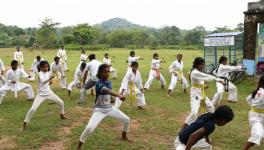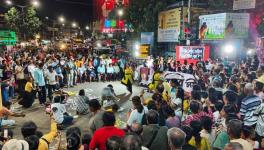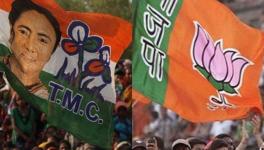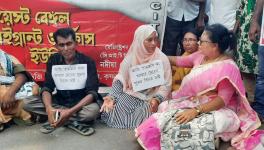WB: Disabled People's Organisation Protests Against the Rape and Murder of a Disabled Girl, Demands Justice
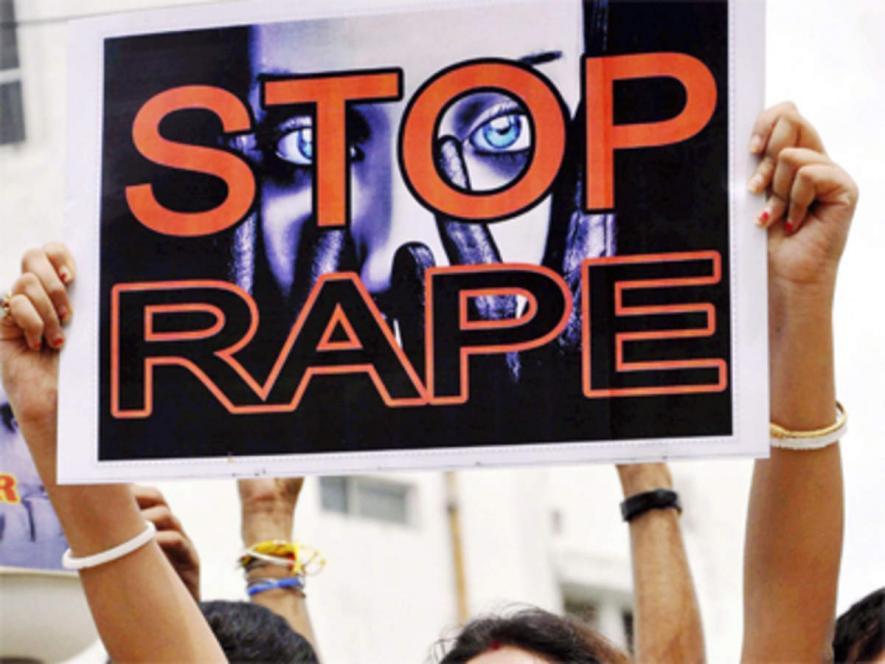
Image Courtesy: PTI
Very few people of West Bengal knew about a tiny hamlet called Pashchim Amjhora, located in the Basanti area of the Sundarbans in the district of South 24 Parganas. However, this little-known hamlet saw a spontaneous protest on January 18, organised by Paschimbanga Rajya Pratibandhi Sammilani (PRPS), the largest disabled peoples' organisation in West Bengal, against the rape and murder of a nine-year-old girl with hearing and locomotors disability on January 4. This little girl was sexually assaulted and subsequently killed by one of her neighbours. Her body was found buried in the neighbourhood.
Speaking at the protest programme, Shri Kanti Ganguly, the general secretary of Paschimbanga Rajya Pratibandhi Sammilani and the chief patron of the National Platform for rights of the Disabled, said, "If this incident had taken place in a big city or if the girl belonged to a so-called elite family, there would have been a lot of hues and cry in the media. News channels might have sent out their reporters and spent a few evenings discussing it, but as the girl is disabled and comes from a low-income family in the remote area of Sundarbans, there is no word in the media."
He thanked the villagers for spontaneously turning up to participate in the protest programme to demand justice for the little girl.
"Your spontaneous support inspires us to take this battle forward. We would be there with this family in their quest to get justice," Ganguly assured the gathering.
This is not a one-off incident of rape and murder of a disabled woman in West Bengal. The political landscape of the state has often convulsed with shocking incidents of crime against women. These crimes were made more gruesome by the utter apathy of the law enforcement agencies in arresting the culprits and bringing them to book.
It has been accused by the opposition political parties and different organisations fighting against such atrocities that, in most cases, the ruling dispensation and the police have been complicit in shielding the culprits.
The horrific incident of the gangrape of a college student in Kamduni, another non-discrete hamlet in North 24 Parganas, in 2013 had shaken the state's conscience. Still, despite sustained protests, most of the accused were allowed to go scot-free. A similar template was played in Hanskhali, Nadia, last year when a student of class nine was raped and murdered by a local miscreant who happened to be the son of one of the strongmen of the ruling party.
Against this backdrop of impunity against such atrocities, disabled women have become soft targets of the miscreants. PRPS has taken up scores of such cases for the last ten years and lodged protests at different levels. The incident in Pashchim Amjhora is not the sole incident of assault on a disabled woman this year.
On January 7, reports emerged that a hearing-impaired woman was raped in Keshia, a village in the Garbeta-3 block of the Pashchim Medinipur district. The district leadership of PRPS had taken up the case and demanded the arrest of the accused. A few months back, in the same district, two such incidents took place where the administration tried to shield the accused owing to their connection to the ruling party.
In one such shocking incident in Pingla in April 2022, the police arrested the culprit after the pressure exerted by the PRPS and the local villagers, but they did everything so that the perpetrators could be let off. In another incident, the victim's family was forcibly stopped from approaching the police station to complain about the perpetrator, who happened to belong to the ruling party.
As mentioned earlier, this is not a recent development. This has been going on in West Bengal for the last ten years. When so-called 'abled' women are not safe, the vulnerability of disabled women can easily be comprehended. PRPS has been at the forefront of the struggle against such incidents and the air of impunity permeating the state. It is its sustained advocacy along with a few other organisations, harnessed at the national level by NPRD, which was instrumental in bringing about significant amendments in the laws dealing with such crimes.
When the Central government constituted the justice Verma committee to look into the existing legal framework against such crimes in the backdrop of the Delhi gang rape of 2012, which the media had dubbed the 'Nirbhaya' case, some disabled people's organisations, including NPRD had submitted detailed suggestions as to make not only the laws but also the legal system more responsive to the disabled victims.
That the system was not conducive for the disabled victims to get justice became clear when, in 2012, a hearing-impaired girl was sexually assaulted in a government medical college in Bankurah by one of the junior doctors. Although the accused was arrested, due to a lack of information available to the hearing-impaired girl in accessible means, she could not identify the culprit in the test identification parade, which was enough for the accused to be acquitted.
It is well known that disabled people are not a homogeneous group. Different types of disabled people face different types of barriers to accessing information. The same is true for disabled women. Hearing-impaired women need information in a particular form, whereas for visually-impaired women, the challenge is entirely different. It is true for intellectually-disabled women as well. Given the diversity prevailing in the most vulnerable women, the legal system needed to be made more inclusive and responsive to their needs.
The recommendations of the Verma committee contain many forward-looking measures like providing interpreters to hearing-impaired women or special educators if the victim so needs them. Provisions have also been made to videograph the victim's statement in front of the magistrate and the same during witness. For women with restricted mobility, provisions have been made to record their statements at their residences or any place of their convenience. However, in most cases, these provisions are disregarded by law enforcement agencies.
Apart from apathy, one of the main reasons behind this neglect is that these updated provisions are yet to be incorporated into the training modules of the police. The hapless disabled victims have to bear the brunt of this negative attitude. In the Rights of persons with disability Act 2016, there is a section dealing particularly with the assault on disabled women, but in most cases, this section is not invoked by the police while lodging FIRs. This is also due to a lack of awareness among the police personnel.
Apart from the apathy of the administration in pursuing such cases, disabled women do have to negotiate the neglect and apathy of the family in particular and society in general. Whenever such cases come to light, the first impulse of the victim's family, it has been seen, is to hush the matter up in fear of any social backlash. When some families come out of this negative mindset, they have to deal with an apathetic administration and an indifferent society.
Even the much-touted intelligentsia of West Bengal, who were once ubiquitous in their protest against any shadow of injustice, prefer to maintain silence. The attitude of the mainstream social movements, too, remains indifferent to this cause. When the victims are disabled, all onus seems to be on the disability movement to take up this cause.
Amidst an atmosphere of gloom hanging over West Bengal, the protest in Pashchim Amjhora is a ray of hope, given that the villagers took part in the protest rising above class, caste or politics. This solidarity has to be replicated throughout the state to mount a significant resistance against the miscreants who seem to be on a rampage under the current dispensation.
Anirban Mukherjee, who is visually disabled, is the president of PRPS and executive committee member of the National Platform for Rights of the Disabled. He teaches English in a secondary school in West Bengal. The views are personal.
Get the latest reports & analysis with people's perspective on Protests, movements & deep analytical videos, discussions of the current affairs in your Telegram app. Subscribe to NewsClick's Telegram channel & get Real-Time updates on stories, as they get published on our website.













